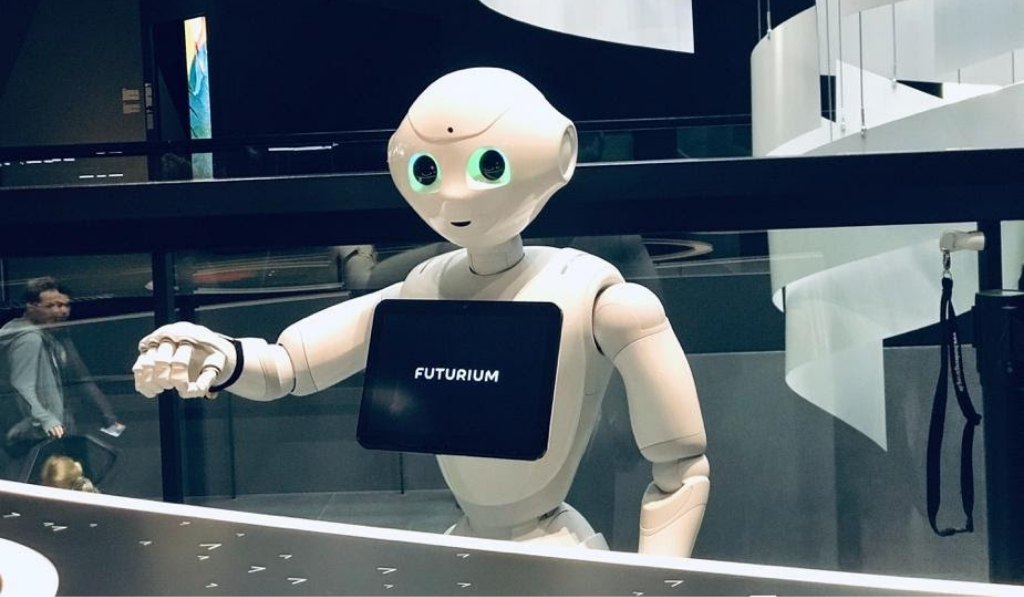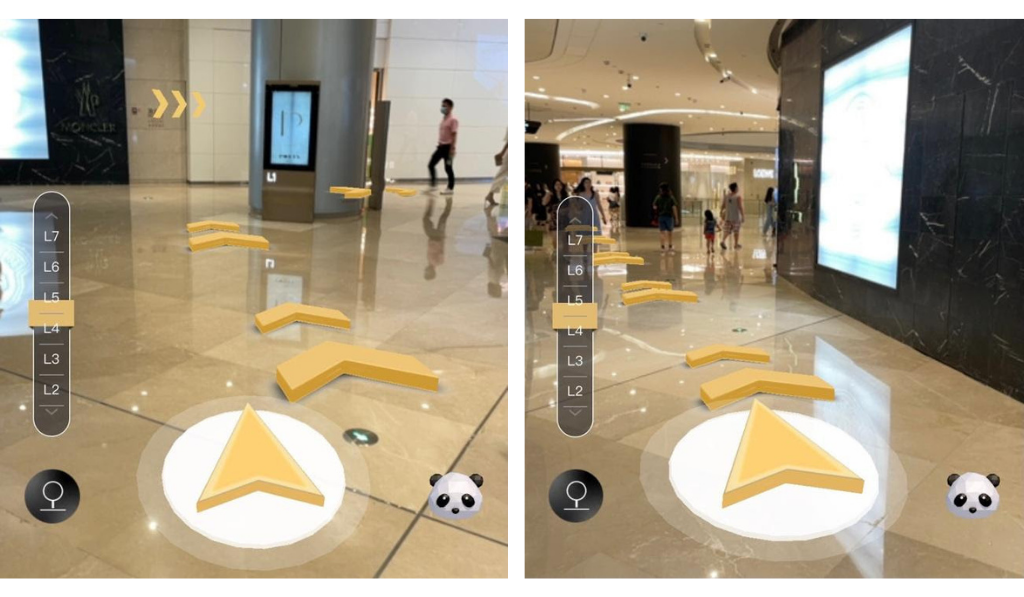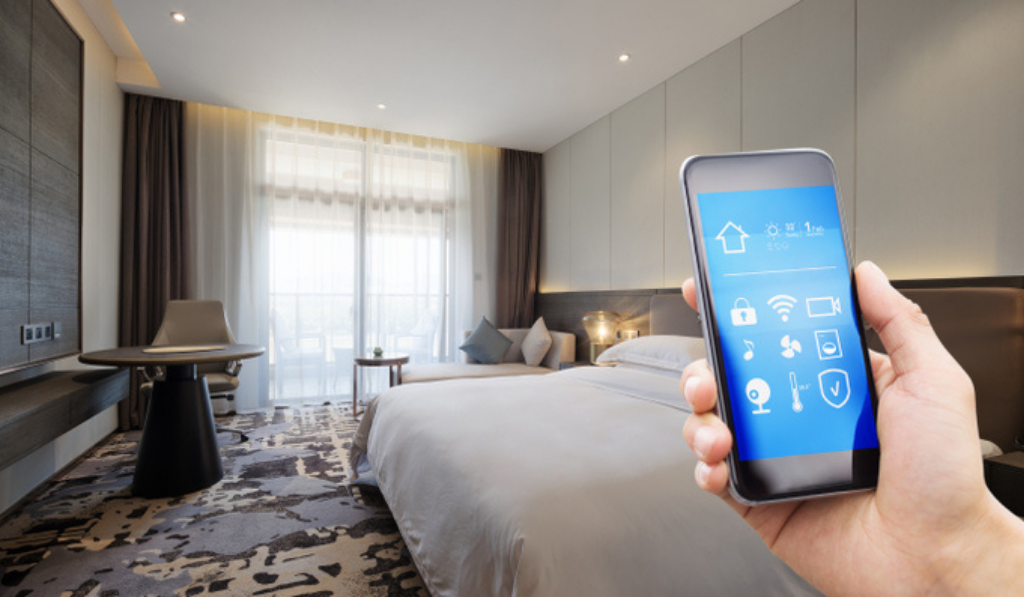Digital Transformation in the Hospitality Industry

By Jingjie Zhu, Ph.D. student, School of Management and Marketing, Curtin University, Ying Wang, Ph.D. Candidate, School of Business, Sichuan University, and Mingming Cheng, Ph.D., Senior Lecturer, School of Management and Marketing, Curtin University
We are now experiencing the fourth industrial revolution, a period marked by emerging technologies such as artificial intelligence, robotics, virtual reality, the Internet of Things, and fifth-generation wireless technology. This period has significantly transformed our hospitality industry and will continue to do so. The recent Covid-19 pandemic has accelerated this digital transformation resulting in a widening technology-mediated customer experience. This article will highlight the current applications of three innovative technologies in the hospitality industry and illustrate how technological innovations can transform hospitality business operations and marketing as well as reshape customer experience.
Robotics in Hospitality
With the advancement in Artificial intelligence (AI), service robots have become more commonplace in hospitality. Service robots are “system-based autonomous and adaptable interfaces that interact, communicate, and deliver service to an organization’s customer” (Wirtz et al., 2018, p. 109). The core interactive and communicative features differentiate service robots from other self-service machines, which result in unprecedented human-technology interactions in the hospitality industry.
Tuomi et al. (2021) suggest that service robots play multiple roles in hospitality service production and delivery. For instance, in the service production process, disinfection robots, which emit UV light to kill viruses and bacteria, were announced to be used in airports and hotels worldwide to ensure a safe and clean environment (Greg, 2020). YOTEL Boston was one of the first hotels to adopt UVD robots. The robots drive around autonomously in high-touch public areas and select rooms at the hotel, removing all airborne viruses and bacteria. As an extension of the hotel’s “SmartStaySafety” operation, the use of UVD robots not only provides a safe environment but also assures guests that they are being protected.
In the service delivery process, service robots assist frontline staff in a sequence of service encounters. For instance, the robot concierges assist employees with guest greetings upon arrival, transporting luggage, guiding guests, and delivering room service. Empowered by the pre-programmed AI and machine learning systems, service robots can effectively respond and interact with guests, even in multiple languages.
While robots make significant contributions to operational efficiency, they also raise concerns. Service robots are still novel in hospitality. Their ability to cope with unexpected, dynamic conditions remains to be fully explored. If guests do not follow the pre-set route, service robots may fail to respond, which can lead to a service failure. Thus, a variety of hospitality businesses, including restaurants, airports, and theme parks, need to carefully consider which service process stage is more suitable for service automation and to develop specific service recovery strategies in response to robot service failure.
Besides service robots, AI-powered online chatbots are also employed to provide swift answers to customers via live chats. With easy access through mobile apps, hotel websites or social media, chatbots provide customers with immediate responses 24 hours a day, significantly improving customer engagement. In addition, chatbots can be extremely helpful during the current pandemic, since hospitality businesses have been short-staffed.
Virtual Reality (VR) and Augmented Reality (AR) in the Hospitality Industry
Sitel group (Jena, 2020) found that customers believed VR simulations would be the best tool for hospitality operators to create a compelling customer experience. The hospitality industry has witnessed the rise in virtual reality (VR) applications over the past few years. Considering the intangible features of the hospitality experience, VR can make a huge difference in a customer’s booking stage. Through the digitally accommodated environment, customers can have a much clearer sense of what they are expecting, thus attracting more prospective customers. One example of VR application is the virtual tour video, which offers guests a first-person point of view of the property. By simply clicking the mouse or wearing a headset, guests can experience a digital walkthrough with a 360-degree view and even see the layout of the rooms in a hotel. This not only offers customers a chance to experience prior to booking, but also allows the hospitality business to benefit from the “try before you buy” marketing strategy.
Unlike VR, which puts customers in a completely virtual environment, augmented reality (AR) is about enhancing the physical environment and the experience of exploring one’s surroundings in real-time. The technology operates by overlaying digital components into a live picture of reality, which can be easily accessed through a smartphone. As a result, AR is extremely valuable for enhancing customers’ indoor experiences in the hospitality industry.

The current applications of AR in hospitality are largely for entertainment and practical purposes. The first is about creating enjoyable guest experiences in an interactive environment on-site. One example is the Best Western Hotel Group’s experiment with AR and Disney stars. Using the mobile app, children can see themselves along with Disney characters in certain areas in the property, which creates an enjoyable experience for children exploring the hotel. Another application of AR is indoor navigation. The IFS shopping mall in Chengdu, China is one of the few properties that has incorporated the technology. Similar to Google maps, AR navigation, the “IFS-ARgo” mini-program, uses the phone camera to capture a live picture of reality and locate guests. Then, it superimposes the directions and guidance onto the live picture. Using the “IFS-ARgo” mini program on WeChat, customers can easily find their ways to shops, elevators, and parking bays.
Internet of Things

Internet of Things (IoT) refers to “an ever-growing network of connected devices which communicate with a central server as well as with each other” (Car et al., 2019, p. 163). In the hospitality industry, IoT provides integrated services, such as automated door locks, light switches, electric blinds, and voice-assistant devices, which are connected on a network. These allow customers to control or monitor their devices from a central server, such as a mobile phone or a tablet.
The hospitality industry has already begun using IoT to improve their businesses and shape customer experience through operation efficiency and personalization. For example, customers can use their mobile phones for self-check-in and check-out. Hilton already offers an option of digital check-in via mobile devices whereby customers can use electronic key cards or mobile room keys embedded in mobile phones to open the room door. Rooms also become “smart” with the help of IoT, which is also called the “connected room” at Hilton hotels. Customers can control many in-room features, such as lighting, room temperature, water temperature, curtains, and TV through their mobile phones or provided tablets. Customers can also use voice-controlled assistants, for example, the Amazon Alexa, to control those in-room features, and order food or drinks, which can be delivered by autonomous delivery robots. In addition, devices, such as luggage carts with GPS function and sensors in the parking lot, can help customers to locate their luggage and cars. Thus, IoT helps improve service processes and makes customer experiences smoother.
Moreover, IoT goes beyond convenience and provides more personalized and customized service. It obtains real-time data through continuous tracking from various devices, as well as a collection of customer information that was previously unavailable, such as preferences, routines, and habits (Marek & Woźniczka, 2017). On one hand, IoT can collect customers’ preferences for in-room features, and the data can then be used to customize the room settings for their next stay. On the other hand, IoT with locational information can send real-time personalized recommendations to customers based on their stored preferences. For example, customers may receive messages or advertisements about nearby tourist attractions, local restaurants or transportation options when they are geographically close to the business or property, based on their preferences, thus improving customer satisfaction through personalized and customized recommendations.
There is still plenty of scope for IoT in hospitality with more connected devices collecting customer data. Together, with new technologies such as AI, big data, and cloud computing, IoT will further enable hospitality practitioners to manage and analyze valuable data. Moreover, with 5G networks, high-speed internet can significantly enhance the power of IoT, resulting in a more connected hospitality world that benefits both providers and customers.
Key Issues & Challenges to Consider
While acknowledging the transformative nature of digital technologies, there are several emerging issues that hospitality practitioners must take into consideration when embracing digital technologies, which include security, privacy, costs, and human touch in hospitality.
Security is a fundamental issue in digital transformation in any industry, including hospitality. Since digital technologies such as AI and IoT are highly connected, they are prone to hacking (Kansakar et al., 2019). Also, the broad connection of various devices brings vulnerability to digital networks. For example, problems in a simple connected device may cause damage to other connected devices and even the entire network. Thus, hospitality managers must prepare for security implications of digital transformation, which can be accomplished by adopting high-security technologies to reduce software vulnerabilities, building resources to mitigate risk of cyber-attacks, and training employees on cyber-attack prevention.
Privacy is another important factor as highly personalized services rely on storing and tracking customer preferences and behavior through digital technologies. Customers are increasingly aware of their data privacy, and any leak of consumer data can lead to a crisis in hospitality. As such, a transparent, strict, and clear privacy policy clarifying what data can be collected and shared, and who can own the data, is necessary. This assures customers their data are in good hands and helps build trust between customers and business providers.
Another challenge is associated with the high costs of employing these digital technologies. For small businesses, using digital technologies in their daily operations may require significant upfront investments. Thus, it is becoming critical for hospitality businesses to consider what digital technologies would most benefit their business. For example, while VR is powerful in providing interactive and immersive experiences, it requires significant investments on high-quality VR headsets and hardware. Thus, for small hospitality businesses, they need to prioritize what works best for them when adopting digital technologies. Some simple digital technologies might be tested before making significant investments, such as digital menus, to make sure small business owners are comfortable adopting digital technology, along with the required efforts and investments.
The last issue to keep in mind is that of the paradox between digital convenience and in-person experience. In hospitality, particularly in fine dining restaurants, customer-staff interaction is highly valued by customers. Digital transformation, such as voice assistants, might diminish that interaction. Thus, it is important for hospitality businesses to strike a balance between digital convenience and in-person experiences. Key considerations include judging what services cannot be replaced by digital tools, preservation of the choice for customers to decide between digital or human services to maximize customer experience, and incorporation of interactive digital features in the process.
Covid-19 has expedited the digital transformation of the hospitality industry with unimaginable speed, forcing many hospitality practitioners to adopt digital technologies that would otherwise not be adopted so quickly. Digital transformation in the hospitality industry is more significant than ever, and it’s time for hospitality businesses to embrace this change.
References
32 comments
This is true in today`s world. Please, get more on this
The whole World is moving to the digital era of Technology where things automatical work with AI and Machine learning technology. So learning about technology and computers is mandatory. If you want to pass the Salesforce B2C Commerce Architect exam we provide B2C-Commerce-Architect dumps that cover over 96% of real exam questions, which can guarantee you pass the exam.
I can say that it’s actually important to help people grow in various fields. One of my friends used to struggle with learning English, and I recommended checking out Promova to him, you can check here to learn more about it, and it didn’t take him long to find a good tutor and improve his English, it turned out to be quite beneficial for him.
Well I always worry about any moments related to the search for various specialists on the Internet. There is a little distrust that something will go wrong. But in general, having worked with the specialists of this studio sloboda-studio.com, I was convinced that there are really excellent outsourced developers who provide high-quality and safe services.
Depends on what kind of business you are in. If you are in a retail business, that won’t work. Just because your customers always hide what they really think.
In a way you are right, of course. What’s the use of using the trendiest of the marketing tools if you cannot figure out what your customers think of your products and services. But I head that with crowd counting machine learning you will be able to understand it. So why don’t you contact this company and ask?
I must say your content is very much impressive and useful. Keep it up.
TellPopeyes
We can apply AI technology to this field. One of the typical technologies is ChatGPT. Try ChatGPT for free here: https://storysaverhd.io/chatgpt-online/
The article examines how digital transformation is reshaping hospitality. It highlights innovations like automated services, virtual concierges, and customized experiences enhanced by AI. As conversational agents like ChatGPT continue evolving, they could provide greater personalization for guests while optimizing efficiency. Though promising, thoughtfully integrating such technologies will be key for the industry’s digitization. Overall, an insightful look at tech’s transformative potential in hospitality. Experience ChatGPT Gratis completely free without needing an account or login: https://gptgratis.net/
ChatGPT is a natural language processing tool driven by AI technology that allows
you to have human-like conversations and much more with the chat gpt login free.
Openai login
Tonton Astro Ria for live episodes of Malay dramas and Malaysian telefilms 2024.
Explore Drama Melayu free online 2023 and enjoy free series online dfm2u hd today.
Tonton Astro Ria
Supporting personal growth is crucial. A friend facing challenges in learning English found success with Promova. Discover more about it [insert link]. Recommending this platform led him to a skilled tutor, significantly enhancing his English proficiency—a valuable and beneficial. story saver
Chat GPT Login FreeWith ChatGPT, find instant answers, professional and creative inspiration.
ChatGPT for Google is an extension that shows AI online free use alongside Google and openai
Chat GPT Website
An updated mod, named Blue WhatsApp Plus APK Download with more emojis, themes and fonts,
Complete customizing includes everything APK with online free version WhatsApp Plus Blue.
Blue WhatsApp
The industry of vibrating butt plugs for men and women is now very popular.
Instagram Story Downloader is a one-step solution for downloading any Instagram user’s story without letting them know.
Stories Saver by storiessaver.org is a web tool that help users to save or download Instagram Story anonymity.
https://storiessaver.org/
Ver doramas online Doramasmp4 is a free asian drama website where millions visit
to watch asian shows online. mira antes que nadie los últimos doramas Gratis online.
DoramasMp4
Effortlessly download MP3s from YouTube with a trusted converter. https://ytmp3.ing/
Encountering GB WhatsApp Pro, individuals might ponder its potential enhancements over the standard version, sparking curiosity about its features and functionality.
Encountering “GB WhatsApp Pro,” individuals might ponder its potential enhancements over the standard version, sparking curiosity about its features and functionality.
https://whatsgbpro.org/
Gold WhatsApp APK is the leader of WhatsApp Free with over 10 Million+ downloads
WhatsApp Gold is a MOD or unofficial application inspired by WhatsApp Plus Update.
WhatsApp Gold APK
Download Whatsapp Plus APk latest free version, the most popular mod of WhatsApp, for free
The original and safe Whatsapp Plus apk file 2024 official latest version is just released.
Whatsapp Plus Download
DramaCool is the best platform offering you a Asian Dramas tv shows free online.
Dramacool is free for every one high-quality videos will not let you down website.
Dramacool
InstaPro, a third-party Instagram tool exclusive to Android, offers direct photo downloading and can serve as a viable alternative to the official app.
https://instaproapps.com/
This article is well written and engaged.
Now checking SASSA SRD R350 status is easy and fast.
KissAsian is the best website to watch Asian Drama 2024 online free in high quality.
where you can watch Movies and kshows without any sign up or registration fast servers.
We provide Dramas Hd Premium quality with English Subbed for Kissasian drama lovers.
KissAsian
Download and install the PicsArt Mod APK from our website so you can enjoy premium
and unlocked latest version for free, You can get it on your android cell phones free.
PicsArt
Bigg Boss OTT New Season 3 Watch Online Visit
On biggbossott3.com Official Web Full HD Video.
Bigg Boss OTT 3
Bigg Boss OTT New Season 3 Watch Online Visit
On biggbossott3.live Official Web Full HD Video.
Bigg Boss OTT 3